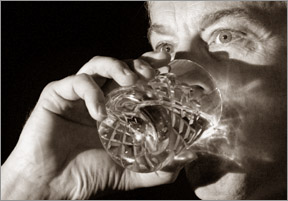Tamil gangs tackled from 'within'
For a 26-year-old, Abhya's face seems to have too many scars. "That
was someone trying to take my eye out with a broken beer bottle," he
said pointing to the circular scar almost encircling his right eye.
|

Britain's Prime Minister Tony Blair takes a drink, during his
monthly news conference at 10 Downing Street in London, Tuesday Feb.
27, 2007. -AP |
"And this here was a cut from a samurai sword," he added, showing a
cut which extends from his hairline to his right eyebrow.
The scar sent shivers down my spine, but Abhya, who did not want to
be identified, describes a confrontation with a rival group at a wedding
in 2005 in Ilford, east London, in a matter-of-fact way. "They chased me
down the high street. When I confronted them, one of them cut me on the
forehead." Those who attacked Abhya were members of a Tamil gang.
Since 2000 Tamil gangs in London have been involved in many gory
confrontations, which have resulted in 10 deaths, spurring the
Metropolitan Police to set up a special task force, Operation Enver, to
tackle Tamil gang-related incidents. Abhya says he used to 'hang around
with friends' and got involved in fights, but denied being in any
organised gang.
A childhood friend's gruesome death in 2003 jolted him into reforming
his ways. His friend was 23. "He was watching TV downstairs and I was
upstairs with other guys when a group wearing masks came and shot him
thrice through the window. He died on my birthday."
Chief Inspector Derrick Griffiths, who has been involved with the
special task force, said there are five main Tamil gangs in London.They
are based in East Ham and Walthamstow in east London, Wembley in
north-west London and Merton and Croydon in south London. The East Ham
group is the biggest with 30 core members.
Despite these measures and a relatively quiet two years, people still
live in fear as police were only able to secure convictions in two of 10
murders, said Mr Griffiths.
Sri Lankans in London
"All crimes were detected and people were charged but what we found
was the level of intimidation was so high that we couldn't get anybody
from the Tamil community to come to court and give evidence," he said.
The gang violence shocked the nearly 100,000-strong Sri Lankan Tamil
community in London.
Vellupillai Jegendira Bose, 58, who owns an estate agency on East Ham
High Street, faced the wrath of the gangs when he attended a community
meeting called by the police. "After the meeting I was joking with the
officer that I may need protection, and when I returned someone had
shattered the display window of the shop," he said.
Most of the violence has resulted from inter-gang rivalries and
revenge attacks stemming from territorial control, community leaders
believe. Historically the gangs have largely been involved in credit
card frauds and extortion from local businesses.
A police operation uncovered that in the past two years alone, credit
card frauds by Tamil gangs amounted to o70m. In Newham, for instance,
gang members demand o10,000 to o15,000 a year from shops and businesses
while they confiscate cars from people and demand up to o3,000 for their
return, Mr Griffiths said.
And the money is sent to Sri Lanka to fund the LTTE. But this has
been repeatedly and vehemently denied by community leaders although some
do believe that the Tamil Tigers use gangs to threaten people.
Paul Sathianesan, a councillor in Newham, said: "The anti-social
behaviour is damaging race relations and spoiling the image of the
community, but it is mostly territorial control with these boys. They
have nothing to do with the fighting in Sri Lanka."
Mr. Griffiths said they have successfully subdued some gangs by
arresting and slapping ASBOs on main players, but many businessmen like
Mr Bose say some should be deported to send a strong message.
Deportation is a tricky issue, said Mr Griffiths, although police have
submitted at least 24 names to the Home Office.
"The boys get rid of their ID papers so when they are taken back to
Sri Lanka the immigration there says we can't prove their nationality,"
he said. Also many of these boys are second generation Tamils who are
born and bred here." Mala Krishnaraja, 56, who heads Tamil Community
Forum, said young children are most vulnerable.
"Boys of 12 and 14 are being lured by the gangs. The attraction of
having money and flashy cars and the show of power gets the children
interested in gang culture." The police have carried out regular raids
to seize weapons from gang hide-outs.
While their weapon of choice seems to be samurai swords, axes and
daggers, guns have started infiltrating the leadership, some of whom now
carry pistols, Mr Griffiths said.
BBC
|
